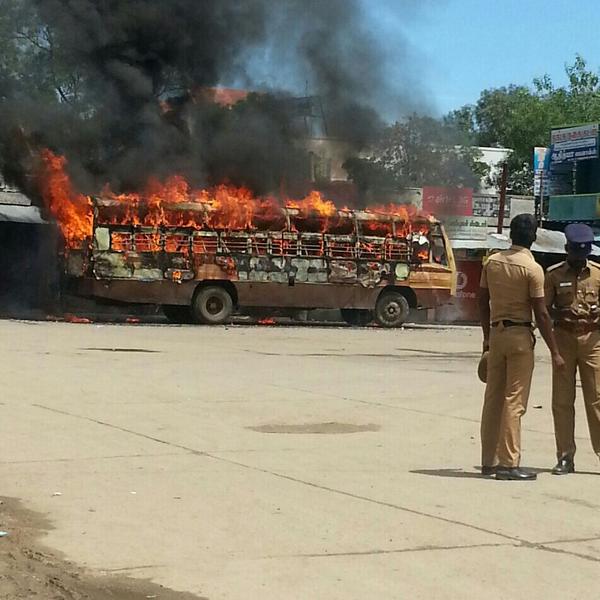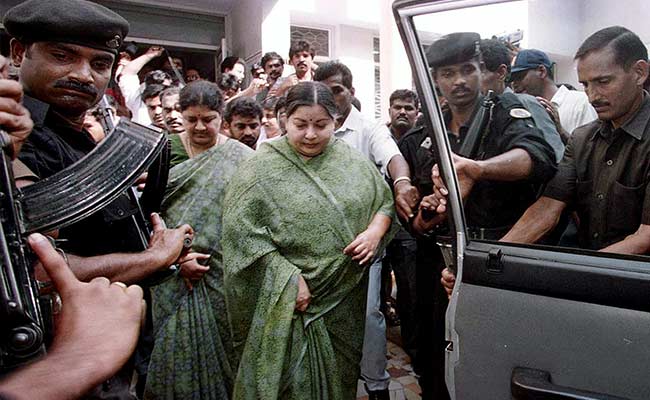In the disproportionate asset case slapped on Tamil Nadu chief minister J Jayalalithaa, her close aide Sasikala, her sister Ilavarasi and Sudhakaran. In the final verdict in the case, John Michael T Kunha
declared all the four are accused in the case and awarded four years imprisonment along with Rs25 crore fine for each one of them at the special court in Bangalore on Saturday.

As the verdict is out now, there are several questions about the legal ramifications in the case. The Hindu journalist Mr.K.Venkataraman has answers for replied for all the queries.
Q: Can she appeal? Or is this it?
Ans: She has the right to appeal. This is only a Special Court.
Q: What's the maximum possible sentence?
Ans: The Act provides a minimum of one year's prison term and a maximum of seven years.
Q: Who becomes next CM now?
Ans: It's anybody's guess. There are many names doing the rounds. Finance Minister O.Panneerselvam, who on a similar occasion earlier became Chief Minister, and Visalakshi Nedunchezhian top the list.
Q: Will she will be taken into custody immediately?
Ans: If the sentence is up to three years, the Court has the power to suspend its own sentence for some time to enable the accused to appeal. It is the court's discretion. For terms above three years, the court doesn't have this power and the accused will have to go to a higher court on appeal and seek suspension of the prison term. In such circumstances, the accused will have to be taken into custody and lodged in prison.
Q: PR act bars convicted person to be MLA/MP. Which section bars them to be CM/PM/Minister? Will there is a situation where Jayalalithaa is not an MLA but still CM?
Ans: The Representation of the People Act, 1951 does not bar or enable someone to become CM/PM/Minister. It is provided for in the Constitution. Normally, a non-member can be CM for a maximum of six months. However, in 2001, when under a subsisting conviction, she was appointed CM without being a member, the Supreme Court quashed her appointment. The present position is that a non-member can be a Minister only if he or she is eligible to contest and not disqualified for contest.
Q: What happens to her assets?
Ans: There are provisions in law to identify and dispose of such assets through auction, but that is a long way away as it involves a separate process. The appeals will also have to be disposed of.
Q: What will now happen to the TN's assembly?
Ans: The Assembly will not be disturbed.
Q: Can she contest in the next election?
Ans: If the disqualification continues -- that is if the conviction is not overturned or stayed by a higher court -- she cannot contest the next election
Q: Once the sentence period is over can she become CM instantly?
Ans: The law is that the disqualification continues for six years from the date of release.
Q: Why should current set of Ministers resign if the verdict is against her?
Ans: The Cabinet is a single unit and it is wholly appointed on the CM's advice. There is no Cabinet without the CM. The next CM will have to advice the Governor on appointing Ministers
Q: What cases remain open against Jayalalithaa? Can this case be reopened by anyone who wants to appeal against the verdict
Ans: A couple of income taxes and one pertaining a foreign remittance are the only other cases pending against her. The IT case is going on in Chennai, and the foreign remittance (CBI) case is bogged down in technicalities in the Supreme Court. Cases in which she has already been acquitted at the level of the SUpreme Court cannot be reopened
Q: Which state she will be put in jail?
Ans: As of now, it will be in Karnataka. But she has the right to seek a transfer to TN, as the only reason the case was shifted to Bangalore was to ensure a fair trial, which has been achieved.
Q: What will be the legal steps if punishment upto 3 years and more than 3 years?
Ans: Up to three years, the Court has the power to suspend its own sentence and give the accused time to file an appeal. Until then, they need not go to jail. Above three years, the court doesn't have this power and has to commit the convicts to prison.
Who will pay the court expenses?
Ans: The government foots the bill.
Q : Will DMK will gain political mileage through this?
Ans: Yes. The DMK will gain political mileage, more so in the 2016 Assembly elections
Q: Can a State CM declare emergency and continue rule?
Ans: There is no such provision in the Constitution for a state-level Emergency
FAQ
Q: Why did this case take 18 years from first complaint to final verdict?
Ans: The trial was near completion in 2000. However, after the change of regime in 2001, the AIADMK government recalled all the witnesses to change their testimony. The SUpreme Court termed it an attempt to derail the case and transferred it to Karnataka, where it had to be started afresh. Several petitions, translations of documents, large number of legal issues raised, changes in judges and prosecutors, large number of witnesses -- these were among the reasons for the delay
Q: Did this case initially come under Karnataka's jurisdiction?
Ans: No, it was transferred to Karnataka under the Supreme Court's orders. The court felt a fair trial was not possible in Tamil Nadu under AIADMK rule
Q: Can the subjective opinion of a judge change the course of justice?
Ans: Yes, that is why the law provides for appellate remedy.




.JPG)











/High-Court-of-Karnataka-2.jpg)





 Interestingly,
four major corporation including Vellore have passed out a resolution against
the verdict issued on the AIADMK party supremo J Jayalalithaa.
Interestingly,
four major corporation including Vellore have passed out a resolution against
the verdict issued on the AIADMK party supremo J Jayalalithaa. .JPG)









.jpg)
.JPG)
